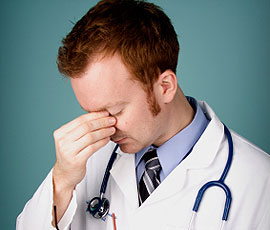June 4th, 2010 by Toni Brayer, M.D. in Better Health Network, Health Policy, Health Tips, News, Opinion, Research, True Stories
No Comments »

 From Dr. Toni Brayer at Everything Health:
From Dr. Toni Brayer at Everything Health:
We medical folks have always known that July is the worst time for a patient to be admitted to the hospital. It has nothing to do with nice summer weather or staff vacations. Although it cannot be proven, we think the answer to the mystery of July hospital errors is human — yes, it’s the new interns.
A new study published in the June issue of the Journal of General Internal Medicine looked at all U.S. death certificates from 1979 to 2006. They found that in teaching hospitals, on average deadly medication mistakes surged by 10 percent each July. The good news is they did not find a surge in other medical errors, including surgery or in non-teaching hospitals. Read more »
*This blog post was originally published at ACP Internist*
May 11th, 2010 by StevenWilkinsMPH in Better Health Network, Health Policy, Opinion, Research
No Comments »

I have to give my dentist credit. He and his staff know when I am due for a cleaning and call me to schedule an appointment without fail. They also call to remind me the day before an appointment. Many dentists, I understand, do similar kinds of things for their patients.
As a patient, I like being reminded — it’s a great service. I also like the fact that someone’s looking out for me. From a business perspective it makes a lot of sense as well. Fewer “no shows,” more cleanings, more billings, and so on.
It’s too bad that more physicians don’t routinely follow up with their patients, particularly when it really counts. Read more »
*This blog post was originally published at Mind The Gap*
March 27th, 2010 by KevinMD in Better Health Network, Health Policy, Opinion, Research
No Comments »

When nurses sign out during the end of shift, it’s done so in a quiet setting. Contrast that to medical residents — at least when I was a resident 8 years ago — where pager interruptions during sign out were the norm.
PookieMD compares the situation to the “sterile cockpit” that airline pilots enjoy:
“Pilots have the sterile cockpit–a situation in which, if the plane is below 10,000 feet, only conversation directly relevant to flying is allowed. The rule was developed because take offs and landings are the most likely time a crash will occur, and take offs and landings occur below 10,000 feet. Simple enough, and it saves lives.”
Physicians enjoy no such luxury. Patient discussions with other doctors often take place in distracted settings, under the threat of a pager going off at any time.
Changing this, PookieMD argues, requires a cultural shift. As mentioned earlier, when nurses sign out, it’s sacred time. Doctors need something similar. Studies show that medical errors can arise during the patient hand-off to another physician. Signing out patients in an undisturbed setting may minimize the risk of poor communication, and subsequently, potential mistakes. “Page early and often needs to be replaced with ‘page urgently when appropriate,’” writes PookieMD.
Let’s see if hospital administrators have the courage to make this happen.
*This blog post was originally published at KevinMD.com*
March 24th, 2010 by DavidHarlow in Better Health Network, Primary Care Wednesdays, Research
No Comments »

Ten years after the release of the IOM report To Err is Human, which documented the toll taken by medical errors in this country, the question remains: What can be done to reverse the trend of ever-increasing morbidity and mortality due to medical errors? Last December, a look back over the decade since the release of To Err is Human — and a steady medical error death rate of about 100,000 per year included a series of suggestions for tweaks to the health care delivery system that may help ameliorate the situation. Earlier this week, a gadget that enforces good handwashing technique by sniffing caregiver and clinician hands for soap before a hospital patient may be touched has been touted as potentially saving significant costs related to HAIs.
Today, the Lucian Leape Institute released a report titled Unmet Needs: Teaching Physicians to Provide Safe Patient Care which focuses on moving back the point in time where an intervention is needed to reverse the trend documented in To Err is Human and since. Leape and his colleagues at the National Patient Safety Foundation are now focused on reinventing the medical school curriculum, so that patient safety will be taught more effectively in medical schools. Read more »
*This blog post was originally published at HealthBlawg :: David Harlow's Health Care Law Blog*
November 23rd, 2009 by EvanFalchukJD in Better Health Network, Health Policy, News, Opinion
No Comments »

There is a disturbing story in the Hartford Courant (via the WSJ Health Blog) on how Connecticut state lawmakers have helped hospitals keep medical mistakes secret from the public. It’s true:
The legislature in 2002 ordered hospitals to disclose all serious patient injuries “associated with medical management.” But after the first reports were made public, hospital lobbyists persuaded lawmakers to rewrite the statute in 2004, limiting the kinds of adverse events that must be divulged, and promising to keep reports secret unless they led to an investigation.
What happened next is predictable. According to the Courant, public access to data about hospital adverse events dropped by 90%. Read more »
*This blog post was originally published at See First Blog*
 From Dr. Toni Brayer at Everything Health:
From Dr. Toni Brayer at Everything Health:














